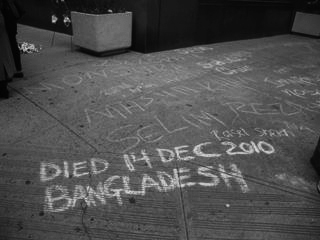WELCOME TO THE ARCHIVE (1994-2014) OF THE MAQUILA SOLIDARITY NETWORK. For current information on our ongoing work on the living wage, women's labour rights, freedom of association, corporate accountability and Bangladesh fire and safety, please visit our new website, launched in October, 2015: www.maquilasolidarity.org
November 14, 2012

On October 2, after over a year of discussions with trade union and labour rights organizations, Gap Inc. announced that it is refusing to participate in a
groundbreaking fire safety program for the garment industry in Bangladesh.
Factory fires have killed over 600 Bangladeshi garment workers since 2006, including in factories producing for Gap. In December 2010, 29 workers died in a fire at the That’s It Sportswear factory in Dhaka, which was producing clothes for Gap, PVH (owner of the Tommy Hilfiger and Calvin Klein brands), and other major brands. Many workers jumped to their deaths from upper floors of the factory because exit doors were locked.
On March 21, 2012, PVH signed an historic agreement with seven Bangladeshi unions and NGOs, the Global Union for garment workers, the Clean Clothes Campaign (CCC), the International Labor Rights Forum (ILRF), the Worker Rights Consortium (WRC), and MSN to establish a comprehensive two-year fire safety program.
The program will include building inspections by independent, trained fire safety experts, public reporting of the results of all inspections, worker-led health and safety committees in all factories and union access to conduct health and safety training, and a commitment by buyers to ensure prices to suppliers sufficient to make workplaces healthy and safe. The agreement is a binding contract between the brands and worker representatives to make these commitments enforceable.
The program will go into effect once a total of four companies have signed on to the agreement. In September, Tchibo, the Germany retailer of coffee, clothing and other consumer products, became the second international company to join the program.
Gap would have been the third company. Instead it decided to set up a separate program, accountable to no one – least of all worker representatives.
“This is the same self-regulatory approach that Gap utilized when its monitors repeatedly gave a clean bill of health to That’s It Sportswear,” says Scott Nova of the WRC.
Nova dismisses the Gap approach as “factory monitoring controlled entirely by the brand, with no transparency, no role for workers or their trade unions, no commitment to pay prices to suppliers that make it possible to operate responsibly, in fact, no binding commitments of any kind.”
“This is just another version of Gap saying, ‘just trust us; we care about our workers’,” says Judy Gearhart, Executive Director of ILRF. “We need Gap to move beyond this approach and sign a binding agreement to really help end these tragic and totally preventable factory deaths.”
The coalition of trade unions and labour rights groups is calling on Gap to reconsider its decision. It has launched an international campaign to convince Gap and other brands to work together with Bangladeshi unions on a comprehensive factory safety program that will protect the lives of the workers who make their products.”
Join the campaign: